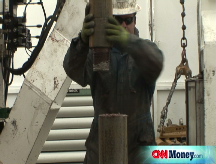The bravest woman in oil
Ann Pickard, Shell's chief in Nigeria, knows the true meaning of oil crisis.
 |
| Ann Pickard at a gas plant near the Niger Delta |
(Fortune Magazine) -- Ann Pickard's title sounds normal enough - she's regional executive vice president in Africa for Royal Dutch Shell's exploration and production division. But there's nothing normal whatsoever about Pickard's job. Indeed, as Shell's top official in Nigeria, Pickard may well hold the most dangerous executive post within the oil industry.
A 53-year-old Wyoming native who helped organize battered women's shelters before entering the energy biz in the late 1980s - "making $7,000 a year doesn't quite cut it," she says of her former life - Pickard is the first woman to run Shell's African operation. She talks a lot about reducing accidents, and by accidents, she's not talking about the industrial variety.
"Our accidents tend to be people getting shot because they're at the wrong place at the wrong time," Pickard says matter-of-factly.
Employees have been robbed and murdered when they ventured onto the wrong roads. Nigeria's kidnap-for-ransom epidemic took a turn for the worse last year when the five-year-old child of a local Shell employee was kidnapped (though later returned unharmed).
In September, rebels launched attacks on a Shell pipeline, gas plant, and flow station, killing two workers. And while Nigeria's deepwater operations had once been immune to the unrest, in June a Shell oil platform 75 miles from shore was attacked.
"I don't think it was an attack on Shell per se, but more a political point being made to the government that the militants can reach anywhere the industry operates," says Pickard, who reports to Shell's E&P chief Malcom Brinded.
A mother of two young children, Pickard says she would not remain in Nigeria if she believed her children or husband, a retired naval officer, were in danger. (She typically travels with bodyguards and police escorts.) Why does Pickard stay? "I like these types of environments because you make a difference," Pickard says.
She ticks off a list Shell's contributions to local communities - ranging from employment to health programs to college scholarships. Still, Shell's 70-year presence in Nigeria remains controversial, both among environmentalists and among ethnic minorities who want a bigger share of the nation's oil wealth. Next February, for instance, a U.S. federal court will hear a suit brought against Shell by the family of an environmental activist who was arrested and ultimately executed by a Nigerian military tribunal in 1995; the family claims Shell was complicit in his death, something Shell denies.
Sometimes the economic payoff for Shell (RDSA) can seem as tenuous as the security situation. By some estimates, 100,000 barrels of oil a day are stolen by gangs and rebels who commandeer pipelines. In the fourth quarter of last year, security problems in Nigeria contributed to a $716 million charge against earnings for Shell.
And while Nigeria accounts for about a 10% of Shell's worldwide oil and gas production, the country's contribution to Shell's profits is much lower given the nation's sky-high royalty rates. The Nigerian government keeps about 95% of all oil and gas profits.
Why then does Shell tough it out? Pickard notes that there aren't a lot of other oil-rich countries rolling out the welcome mat for Western oil companies these days. "When I give speeches, there's a map I show that color-codes oil producing regions based on their openness to multi-national oil companies. Green is most open, and red is least," Pickard says. "Well, the entire world is starting to turn red against us. I've got Russia turning red, Venezuela turning red, Bolivia turning red. The Middle East is almost entirely red.
"Right now, Nigeria is the biggest green out there." ![]()
-
 The retail giant tops the Fortune 500 for the second year in a row. Who else made the list? More
The retail giant tops the Fortune 500 for the second year in a row. Who else made the list? More -
 This group of companies is all about social networking to connect with their customers. More
This group of companies is all about social networking to connect with their customers. More -
 The fight over the cholesterol medication is keeping a generic version from hitting the market. More
The fight over the cholesterol medication is keeping a generic version from hitting the market. More -
 Bin Laden may be dead, but the terrorist group he led doesn't need his money. More
Bin Laden may be dead, but the terrorist group he led doesn't need his money. More -
 U.S. real estate might be a mess, but in other parts of the world, home prices are jumping. More
U.S. real estate might be a mess, but in other parts of the world, home prices are jumping. More -
 Libya's output is a fraction of global production, but it's crucial to the nation's economy. More
Libya's output is a fraction of global production, but it's crucial to the nation's economy. More -
 Once rates start to rise, things could get ugly fast for our neighbors to the north. More
Once rates start to rise, things could get ugly fast for our neighbors to the north. More









